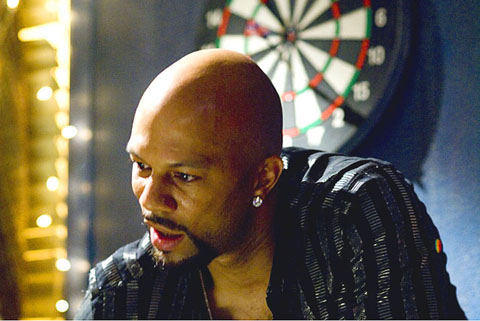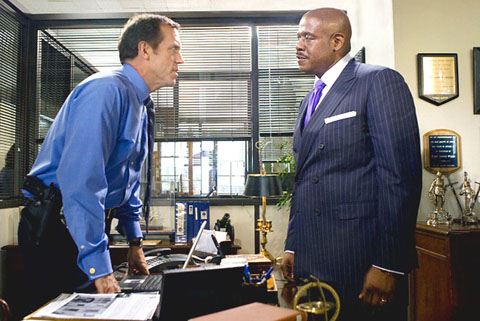The alarm clock buzzes. Keanu Reeves wakes up fully dressed in a striped shirt, raises his gun and rolls out of bed. He puts his piece on the bathroom sink, next to his toothbrush, and takes a good long look at himself in the mirror. Then he pukes in the toilet. He climbs into the car and heads down the freeway as a glowing orange orb shimmers behind the skyscrapers of Los Angeles. Only the sun isn’t rising. It’s setting.
Night: Koreatown. Tom Ludlow (Reeves) stops by a liquor store and gulps down a couple of teeny airline bottles of vodka. He insults some Korean hoods, who want to buy a machine gun he’s got stashed in his trunk, insinuating that they’re Japanese. “You dress white, talk black and drive Jew,” he tells them before throwing in an all-purpose anti-Asian slur.
Ludlow is a racist cop, a renegade cop, a vigilante cop. We know this because next he wantonly massacres a bunch of Korean bad guys and makes it look like they shot one another. Then, when he’s confronted by his African-American ex-partner, Terrence Washington (Terry Crews), he yells, “I’m racist!” In response, Washington calls him a “white boy.” This seems especially odd because the Chinese-Hawaiian-Caucasian Reeves is, ancestrally speaking, roughly as white as Barack Obama.

This is the setup for Street Kings, which immediately forgets it ever brought up all that racial stuff anyway. Almost as quickly, it loses interest in its main character’s alcoholism. Then it raises the idea that Ludlow may still be in pain over his wife’s death, but instantly ignores that, too, turning its deficit of attention to the killing of a police officer. The murder investigation leads the bull-headed Ludlow — who, mind you, does not play by the rules! — along a twisted trail of corruption that leads all the way to the highest levels of the LAPD. Yeah, I know. Who could have anticipated that?
If you wanted to make a strictly generic parody of crime writer James Ellroy’s hard-boiled Southland fiction (L.A. Confidential, The Black Dahlia, White Jazz), could you do worse than to hire Ellroy himself and then, maybe, re-write him a few times? Maybe not, because that’s what appears to have happened here. Ellroy is credited with the template-stamped story and is listed first in the screenplay credits, followed by Kurt Wimmer and Jamie Moss, each of their names separated by an “and” instead of an ampersand, which tells you that they did not work together. Director David Ayer (writer of Training Day and cowriter of The Fast and the Furious) has also been fingered as a scripting suspect, but he is not identified by name in the final line-up. If you’ve seen the trailer, know that about half of what’s in it isn’t in the final movie. That’s a hint.
Street Kings is an anemic attempt to evoke the big, shiny action pictures of the late 1980s and early 1990s, the heyday of Bruce Willis and Arnold Schwarzenegger, when Timothy Dalton was 007 and Clint Eastwood had fewer wrinkles and bigger hair. Back when, if an aquarium appeared in a scene, somebody was damn sure going to shoot it before the movie was over. The films, good and bad, were loud and slick and mostly set in LA, directed by people like John McTiernan, Richard Donner, Tony Scott and Renny Harlin: the Die Hards, the Lethal Weapons, The Rookie, The Last Boy Scout, The Last Action Hero.

PHOTOS COURTESY OF FOX
Reeves got in on that wave, too, with Point Break and Speed, dodging bullets and breaking regulations in the name of the law. Those were the days when overkill was never enough, and Street Kings at least gets that part right. The crooked cops are not only crooked, they’re also murderers willing to drop everything to rape their victims’ widows and girlfriends just for fun. They are bad, bad, bad.
So is the screenplay, which reads like a Bartlett’s of general-purpose action-movie lines:
“You were toe-to-toe with evil and you won.”
“Why can’t you have a normal life like everybody else?”
“Everything I touch dies.”
“Who are you to judge me?”
That doesn’t even scratch the surface of the movie’s banality, but every once in a while there’s a real doozy like: “He’s got a PhD in catching cops slipping up!” Or a text message from one crooked cop to another: “He’s here. Kill him.” And then the dude signs his nickname.
But come on, don’t give Keanu Reeves — or anybody, for that matter — a line like this, about Tom’s ex-partner: “We were black and white in black and white, back when it meant something.” Are these people trying to make the Showgirls of retro-1990s cop movies?
Sophomore director Ayer (Harsh Times) is maybe not so sure. He seems invested in the chases and shoot-outs, but sometimes his spatial relationships break down, and you can’t tell who is where. In one gunfight an entire Harvest Gold-colored refrigerator materializes out of nowhere. Meanwhile, Academy-Award winner Forest Whitaker doesn’t seem to know what movie this should be, while House star Hugh Laurie — giving exactly the same performance he does on TV — may be in on the joke, even if nobody else is.

June 9 to June 15 A photo of two men riding trendy high-wheel Penny-Farthing bicycles past a Qing Dynasty gate aptly captures the essence of Taipei in 1897 — a newly colonized city on the cusp of great change. The Japanese began making significant modifications to the cityscape in 1899, tearing down Qing-era structures, widening boulevards and installing Western-style infrastructure and buildings. The photographer, Minosuke Imamura, only spent a year in Taiwan as a cartographer for the governor-general’s office, but he left behind a treasure trove of 130 images showing life at the onset of Japanese rule, spanning July 1897 to

In an interview posted online by United Daily News (UDN) on May 26, current Chinese Nationalist Party (KMT) Chairman Eric Chu (朱立倫) was asked about Taichung Mayor Lu Shiow-yen (盧秀燕) replacing him as party chair. Though not yet officially running, by the customs of Taiwan politics, Lu has been signalling she is both running for party chair and to be the party’s 2028 presidential candidate. She told an international media outlet that she was considering a run. She also gave a speech in Keelung on national priorities and foreign affairs. For details, see the May 23 edition of this column,

At Computex 2025, Nvidia CEO Jensen Huang (黃仁勳) urged the government to subsidize AI. “All schools in Taiwan must integrate AI into their curricula,” he declared. A few months earlier, he said, “If I were a student today, I’d immediately start using tools like ChatGPT, Gemini Pro and Grok to learn, write and accelerate my thinking.” Huang sees the AI-bullet train leaving the station. And as one of its drivers, he’s worried about youth not getting on board — bad for their careers, and bad for his workforce. As a semiconductor supply-chain powerhouse and AI hub wannabe, Taiwan is seeing

Jade Mountain (玉山) — Taiwan’s highest peak — is the ultimate goal for those attempting a through-hike of the Mountains to Sea National Greenway (山海圳國家綠道), and that’s precisely where we’re headed in this final installment of a quartet of articles covering the Greenway. Picking up the trail at the Tsou tribal villages of Dabang and Tefuye, it’s worth stocking up on provisions before setting off, since — aside from the scant offerings available on the mountain’s Dongpu Lodge (東埔山莊) and Paiyun Lodge’s (排雲山莊) meal service — there’s nowhere to get food from here on out. TEFUYE HISTORIC TRAIL The journey recommences with